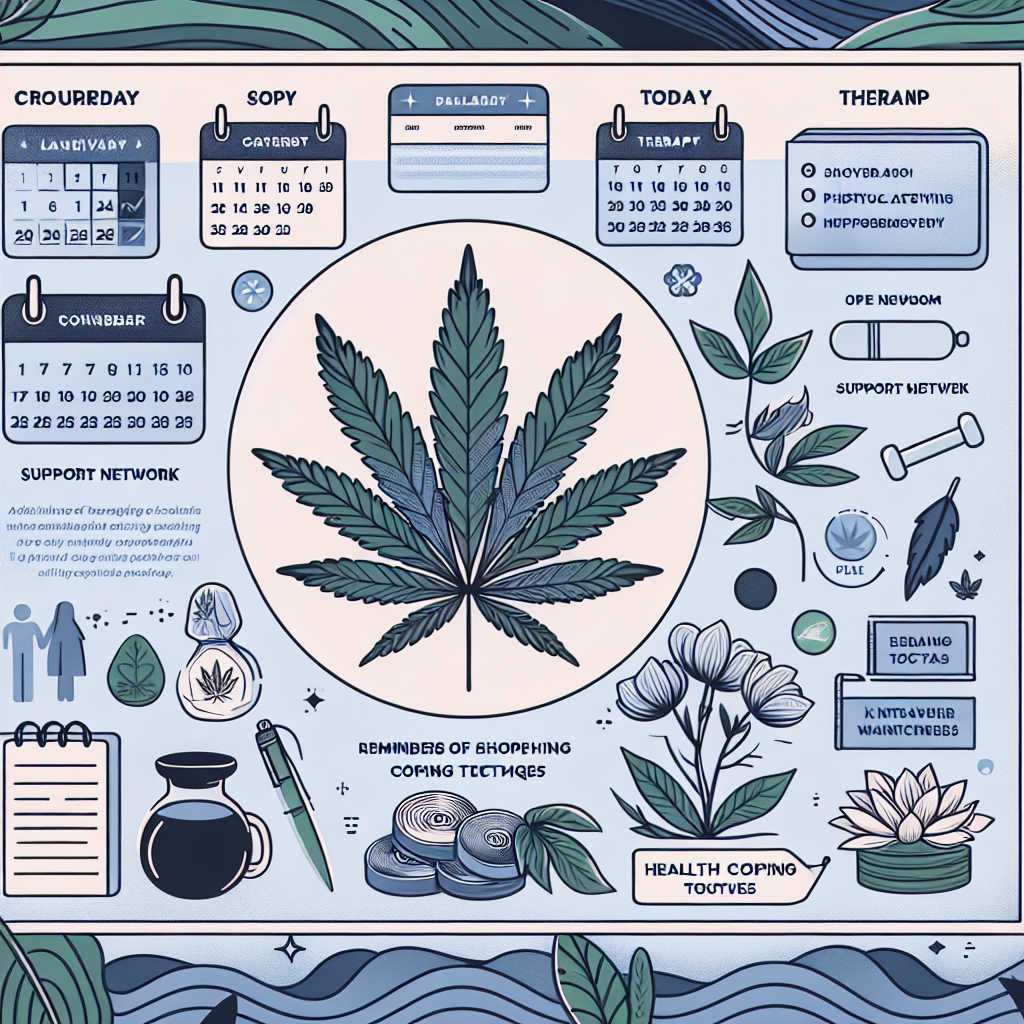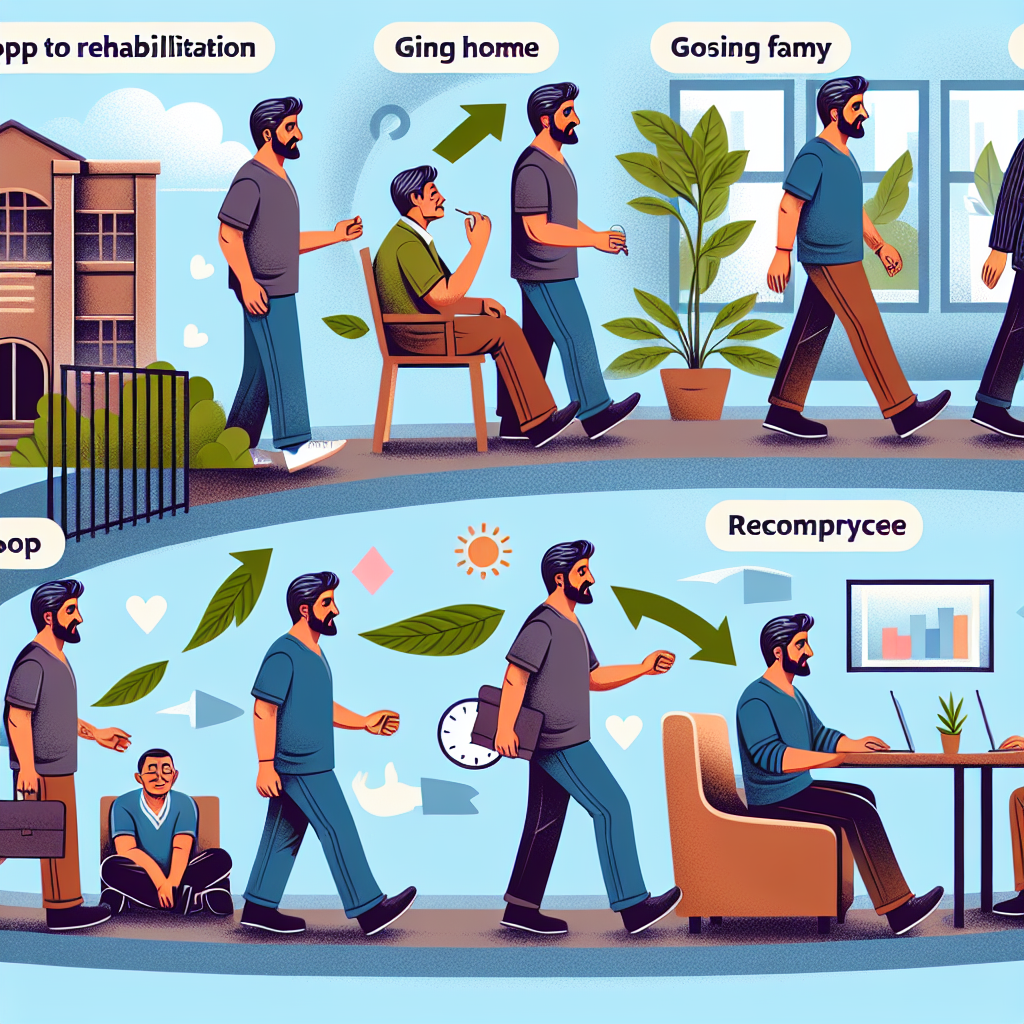-
Table of Contents
“Empower Your Future: Crafting a Path to Sober Living After Marijuana Addiction”
Introduction

Creating a sober living plan after marijuana addiction is a crucial step towards long-term recovery and maintaining a drug-free lifestyle. This plan serves as a structured roadmap that outlines strategies, goals, and resources to help individuals navigate the challenges of sobriety. It involves identifying triggers, developing coping mechanisms, establishing a support network, and setting realistic, achievable goals. By focusing on personal growth, health, and well-being, a sober living plan empowers individuals to rebuild their lives, fostering resilience and a renewed sense of purpose. This proactive approach not only aids in preventing relapse but also promotes a balanced, fulfilling life free from the grips of addiction.
Understanding the Importance of a Sober Living Plan
Creating a sober living plan after marijuana addiction is a crucial step towards long-term recovery and personal growth. Understanding the importance of such a plan can make the difference between relapse and sustained sobriety. A well-structured sober living plan serves as a roadmap, guiding individuals through the complexities of life without the crutch of marijuana. It provides a sense of direction, purpose, and accountability, which are essential components in the journey to recovery.
First and foremost, a sober living plan helps individuals identify and avoid triggers that may lead to relapse. Triggers can be anything from certain people and places to specific emotions or situations. By recognizing these triggers, individuals can develop strategies to cope with them effectively. For instance, if social gatherings where marijuana is present are a trigger, the plan might include finding alternative social activities that do not involve substance use. This proactive approach not only reduces the risk of relapse but also empowers individuals to take control of their environment and choices.
Moreover, a sober living plan emphasizes the importance of building a strong support network. Recovery is not a journey that should be undertaken alone. Friends, family, support groups, and professional counselors can provide invaluable encouragement and guidance. Including regular check-ins with these support systems in the plan ensures that individuals remain connected and accountable. This network can offer emotional support during challenging times and celebrate milestones, reinforcing the commitment to sobriety.
In addition to external support, self-care is a fundamental aspect of a sober living plan. Recovery is not just about abstaining from marijuana; it is about nurturing the mind, body, and spirit. Incorporating activities such as exercise, meditation, and hobbies can significantly enhance overall well-being. These activities serve as healthy outlets for stress and anxiety, which are common triggers for substance use. By prioritizing self-care, individuals can build resilience and improve their quality of life, making the prospect of relapse less appealing.
Furthermore, setting realistic and achievable goals is a key component of a successful sober living plan. These goals can range from short-term objectives, like attending a certain number of support group meetings each week, to long-term aspirations, such as pursuing a new career or educational opportunities. Goals provide a sense of purpose and direction, helping individuals stay focused on their recovery journey. Celebrating small victories along the way can boost confidence and motivation, reinforcing the belief that a sober life is not only possible but also rewarding.
Another critical element of a sober living plan is ongoing education about addiction and recovery. Understanding the science behind addiction, the impact of marijuana on the brain and body, and the principles of recovery can empower individuals to make informed decisions. This knowledge can also help dispel myths and misconceptions about addiction, reducing stigma and fostering a more supportive environment for recovery.
Lastly, flexibility is essential in any sober living plan. Recovery is a dynamic process, and what works at one stage may need to be adjusted as individuals progress. Regularly reviewing and updating the plan ensures that it remains relevant and effective. This adaptability allows individuals to respond to new challenges and opportunities, maintaining their commitment to sobriety.
In conclusion, creating a sober living plan after marijuana addiction is a vital step towards lasting recovery. By identifying triggers, building a support network, prioritizing self-care, setting achievable goals, educating oneself, and remaining flexible, individuals can navigate the path to sobriety with confidence and hope. This plan not only aids in avoiding relapse but also fosters personal growth and a fulfilling, substance-free life.
Steps to Develop a Personalized Sober Living Plan
Creating a sober living plan after overcoming marijuana addiction is a crucial step towards maintaining long-term sobriety and reclaiming control over one’s life. The journey to sobriety is deeply personal, and developing a plan tailored to individual needs can significantly enhance the chances of success. To begin with, it is essential to acknowledge the importance of self-awareness in this process. Understanding personal triggers and the underlying reasons for substance use can provide valuable insights that inform the creation of an effective plan.
One of the first steps in developing a personalized sober living plan is to establish clear and achievable goals. These goals should be specific, measurable, attainable, relevant, and time-bound (SMART). For instance, a goal might be to remain sober for the next 30 days, gradually extending the timeframe as confidence and resilience build. Setting such goals provides a sense of direction and purpose, making the journey to sobriety more manageable and less overwhelming.
In addition to setting goals, it is vital to create a supportive environment that fosters sobriety. This involves identifying and eliminating potential sources of temptation. For example, removing any paraphernalia associated with marijuana use from the living space can reduce the risk of relapse. Moreover, surrounding oneself with supportive and understanding individuals can make a significant difference. Engaging with friends and family members who respect and encourage the commitment to sobriety can provide emotional support and motivation.
Another critical component of a sober living plan is the development of healthy coping mechanisms. Life is filled with stressors and challenges, and having constructive ways to deal with them is essential. Activities such as exercise, meditation, and creative pursuits can serve as effective outlets for stress and anxiety. Additionally, exploring new hobbies and interests can provide a sense of fulfillment and purpose, reducing the likelihood of turning to substances as a coping mechanism.
Furthermore, seeking professional support can be incredibly beneficial. Therapists, counselors, and support groups offer a safe space to discuss struggles and receive guidance. Cognitive-behavioral therapy (CBT), for instance, can help individuals identify and change negative thought patterns that contribute to substance use. Support groups, such as Narcotics Anonymous (NA), provide a sense of community and shared experience, reminding individuals that they are not alone in their journey.
Maintaining physical health is also a crucial aspect of a sober living plan. A balanced diet, regular exercise, and adequate sleep contribute to overall well-being and can improve mood and energy levels. When the body feels good, the mind is better equipped to handle the challenges of sobriety. Additionally, staying hydrated and avoiding excessive caffeine and sugar can help stabilize mood and reduce cravings.
Lastly, it is important to regularly review and adjust the sober living plan as needed. Life is dynamic, and circumstances can change, necessitating modifications to the plan. Regularly assessing progress and making necessary adjustments ensures that the plan remains relevant and effective. Celebrating milestones, no matter how small, can also provide motivation and a sense of accomplishment.
In conclusion, creating a personalized sober living plan after marijuana addiction involves setting clear goals, fostering a supportive environment, developing healthy coping mechanisms, seeking professional support, maintaining physical health, and regularly reviewing progress. By taking these steps, individuals can build a strong foundation for long-term sobriety and a fulfilling, substance-free life. The journey may be challenging, but with determination, support, and a well-crafted plan, it is entirely possible to achieve lasting sobriety and rediscover the joy of living.
Overcoming Challenges in Maintaining Sobriety
Overcoming challenges in maintaining sobriety after marijuana addiction is a journey that requires dedication, resilience, and a well-structured plan. The path to a sober life is often fraught with obstacles, but with the right strategies and support systems in place, it is entirely possible to navigate these challenges successfully. One of the first steps in creating a sober living plan is to acknowledge the triggers that may lead to relapse. Identifying these triggers, whether they are environmental, emotional, or social, is crucial in developing coping mechanisms to avoid them. For instance, if certain social settings or groups of friends are associated with marijuana use, it may be necessary to distance oneself from these influences and seek out new, supportive relationships.
In addition to recognizing triggers, establishing a daily routine can provide structure and stability, which are essential in maintaining sobriety. A well-organized schedule that includes time for work, exercise, hobbies, and relaxation can help keep the mind occupied and reduce the temptation to revert to old habits. Exercise, in particular, has been shown to have numerous benefits for mental health, including reducing stress and anxiety, which are common triggers for substance use. Engaging in physical activities not only promotes overall well-being but also serves as a healthy outlet for managing emotions.
Moreover, seeking professional support is a vital component of a sober living plan. Therapists, counselors, and support groups can offer guidance, encouragement, and accountability. Cognitive-behavioral therapy (CBT), for example, is an effective approach that helps individuals understand the thought patterns that contribute to their addiction and develop healthier ways of thinking and behaving. Support groups, such as Narcotics Anonymous (NA) or Marijuana Anonymous (MA), provide a sense of community and shared experience, which can be incredibly empowering. Connecting with others who have faced similar struggles can foster a sense of belonging and reduce feelings of isolation.
Another important aspect of maintaining sobriety is setting realistic and achievable goals. These goals can be related to personal growth, career aspirations, or health and wellness. By setting and working towards these goals, individuals can create a sense of purpose and direction in their lives. Celebrating small victories along the way can boost motivation and reinforce the commitment to a sober lifestyle. It is also essential to practice self-compassion and recognize that setbacks may occur. Rather than viewing a relapse as a failure, it can be seen as an opportunity to learn and strengthen one’s resolve.
Furthermore, mindfulness and meditation practices can be powerful tools in managing cravings and maintaining emotional balance. Mindfulness involves staying present in the moment and observing thoughts and feelings without judgment. This practice can help individuals become more aware of their triggers and develop a greater sense of control over their responses. Meditation, on the other hand, can promote relaxation and reduce stress, making it easier to cope with the challenges of sobriety.
Lastly, building a strong support network of family and friends who understand and respect the commitment to sobriety is invaluable. Open communication with loved ones about the journey and the challenges faced can foster understanding and support. Encouraging family and friends to participate in sober activities and celebrations can also strengthen these relationships and create a positive, supportive environment.
In conclusion, overcoming the challenges of maintaining sobriety after marijuana addiction requires a multifaceted approach that includes identifying triggers, establishing routines, seeking professional support, setting goals, practicing mindfulness, and building a strong support network. With determination and the right strategies, it is possible to create a fulfilling and sober life.
Building a Support Network for Long-Term Recovery
Creating a sober living plan after overcoming marijuana addiction is a crucial step towards long-term recovery. One of the most vital components of this plan is building a robust support network. This network serves as a safety net, providing emotional, psychological, and sometimes even physical support. It is essential to understand that recovery is not a solitary journey; it requires the collective effort of friends, family, and professionals who are committed to your well-being.
To begin with, involving family members in your recovery process can be incredibly beneficial. Family can offer a sense of stability and unconditional love, which are essential for emotional healing. However, it is important to communicate openly with them about your needs and boundaries. This ensures that they can provide the right kind of support without inadvertently enabling old habits. Family therapy sessions can also be a valuable tool, helping to mend any strained relationships and fostering a more supportive home environment.
In addition to family, friends play a significant role in your support network. Surrounding yourself with friends who understand your journey and respect your commitment to sobriety can make a world of difference. It is crucial to distance yourself from individuals who may encourage or trigger your past behaviors. Instead, seek out friends who share similar goals and values. Engaging in sober activities together, such as hiking, sports, or creative hobbies, can strengthen these bonds and provide healthy outlets for stress and enjoyment.
Moreover, professional support is indispensable in building a comprehensive support network. Therapists and counselors specializing in addiction recovery can offer personalized strategies and coping mechanisms tailored to your unique situation. Regular therapy sessions provide a safe space to explore underlying issues that may have contributed to your addiction. Additionally, joining support groups such as Narcotics Anonymous (NA) or Marijuana Anonymous (MA) can connect you with others who are on a similar path. These groups offer a sense of community and shared understanding, which can be incredibly empowering.
Furthermore, incorporating holistic practices into your recovery plan can enhance your overall well-being. Activities such as yoga, meditation, and mindfulness can help manage stress and reduce the risk of relapse. These practices promote mental clarity and emotional balance, making it easier to navigate the challenges of sobriety. Engaging in regular physical exercise also releases endorphins, which can improve mood and reduce cravings.
It is also important to set realistic goals and celebrate small victories along the way. Recovery is a gradual process, and acknowledging your progress can boost your confidence and motivation. Keeping a journal to track your journey can be a powerful tool for reflection and growth. Writing down your thoughts, challenges, and achievements allows you to see how far you have come and reinforces your commitment to staying sober.
Lastly, never underestimate the power of self-compassion. Being kind to yourself during this journey is crucial. There will be setbacks and difficult days, but treating yourself with patience and understanding can make all the difference. Remember that recovery is not about perfection; it is about progress and resilience.
In conclusion, building a support network for long-term recovery from marijuana addiction involves a multifaceted approach. By involving family, friends, and professionals, and incorporating holistic practices, you create a strong foundation for a sober life. Setting realistic goals, celebrating progress, and practicing self-compassion are key elements that will guide you through this transformative journey. With a solid support network, you are not alone; you are empowered to reclaim your life and thrive in sobriety.
Q&A
1. **What is a sober living plan?**
A sober living plan is a structured strategy designed to help individuals maintain sobriety after overcoming addiction, including setting goals, identifying triggers, and establishing support systems.
2. **Why is a sober living plan important after marijuana addiction?**
It provides a clear roadmap for maintaining sobriety, helps manage triggers and cravings, and offers support mechanisms to prevent relapse.
3. **What are key components of a sober living plan?**
Key components include setting short-term and long-term goals, identifying and avoiding triggers, establishing a support network, and incorporating healthy routines and coping strategies.
4. **How can one identify triggers in a sober living plan?**
By reflecting on past experiences, recognizing situations, people, or emotions that led to marijuana use, and documenting these triggers to develop strategies to avoid or manage them.
Conclusion
Creating a sober living plan after marijuana addiction involves several key steps: acknowledging the addiction, seeking professional help, establishing a support network, setting clear and achievable goals, and developing healthy coping mechanisms. It is crucial to identify triggers and create strategies to avoid them, engage in regular physical activity, and maintain a balanced diet. Continuous self-assessment and adjustments to the plan are necessary to ensure long-term sobriety. Ultimately, a comprehensive and personalized sober living plan can significantly enhance the chances of sustained recovery and a healthier, more fulfilling life.



